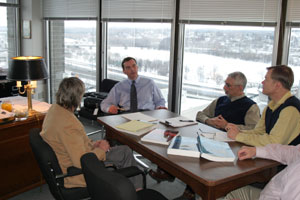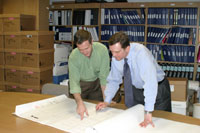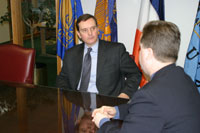
Ronald E. Piester, AIA
 |
“The current focus is on the U.S., but as the construction industry evolves beyond the borders of our country, is it ready to become truly international?” asks Ron Piester (center). “I think ICC has the basic character to do this and is on the road toward making it happen.” |
For Ron Piester, New York State Department of State Division of Code Enforcement and Administration Director, and Code Council Board Immediate Past President, the magic number is 1,600—the total count of local governments he must oversee quality, timely service to. With such a large number of different departments each with unique needs, the position poses unique challenges for a state with 19 million residents.
“Our department must assist all of them with services that are customized, based on their resources and what they need,” Piester said.

Piester said the old days of a construction “season” are long gone. “The whole structure of the industry has changed. There used to be a construction season, and things at the department would slow down. Now it is a 365-day season, regardless of weather.
“There’s no ‘down time’ for us to catch up or further our training and education. We’ve had to adapt to this trend and still provide quality service.”
A big change for the state came in 1984 when a state-mandated code was put into place. Until that point, each local government had its own code, or “even none at all,” Piester said. This solved some problems, but created others, driving the state to work toward adopting an international code, which eventually took place in 2003.
“Moving to the international code helped because we didn’t have the resources to emphasize a statewide one,” Piester said. “Beyond that, the international code let us take a broader look at the code, not just for our state, but from an international perspective.”
The International Code Council played a key role in New York’s move to an international code. Piester became involved with ICC in 1999 when he was asked to go to a meeting “to see what it was all about.” At this meeting, his eyes were opened to the bigger picture of model codes.

Of course, he added, there was some skepticism as to whether the state could pull it off, for the simple fact that it involved the entire construction industry in New York State. “A lot of people thought it would not happen.”
But Piester’s department was successful, and as it took each step, more and more communities came to the state department for help with training and organization.
Also in the name of encouraging a smooth journey toward the international code adoption in 2003, his office undertook a “significant” public relations campaign to provide information to the communities on what they needed to do to prepare for the transition.
“Our office trained about 4,000 building and fire officials in each of these 1,600 jurisdictions and initiated a competency exam for any code enforcement official actively involved in working for the State of New York,” Piester said. “We laid out a plan to think logically. Spending time at the beginning of the process paid off.”
His involvement with ICC has paid obvious dividends, and Piester hopes that ICC continues to push forward with its goal of making a more international name for itself.
He notes that while the formation of ICC was a big milestone, the time to push forward is now.
“The current focus is on the U.S., but as the construction industry evolves beyond the borders of our country, is it ready to become truly international? ” he said, “I think ICC has the basic character to do this and is on the road toward making it happen.”

Piester thanks ICC Members from New York, his staff and all the people who work for the 1,600 communities in his jurisdiction.
“I have a sincere appreciation for our Members in New York for stepping up and doing the right thing. They showed leadership, and that’s not always an easy thing to do,” Piester added.
